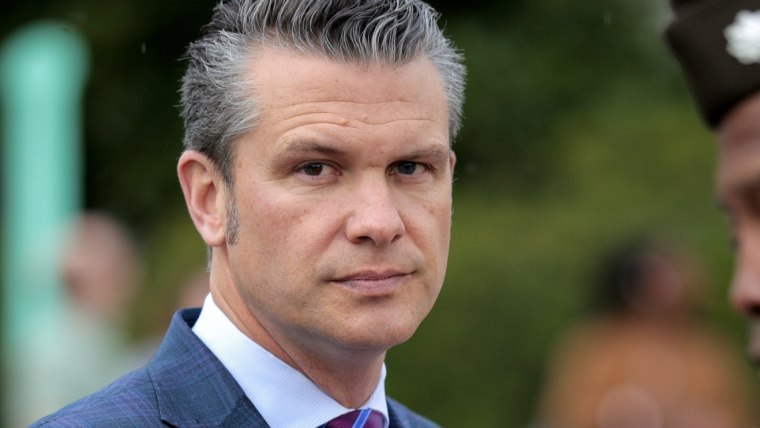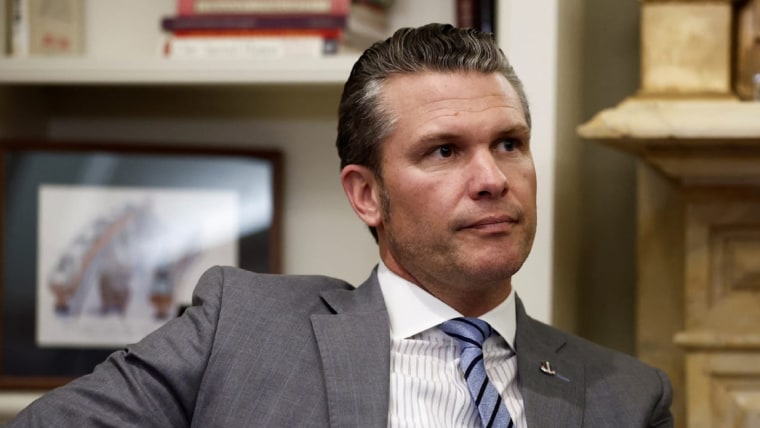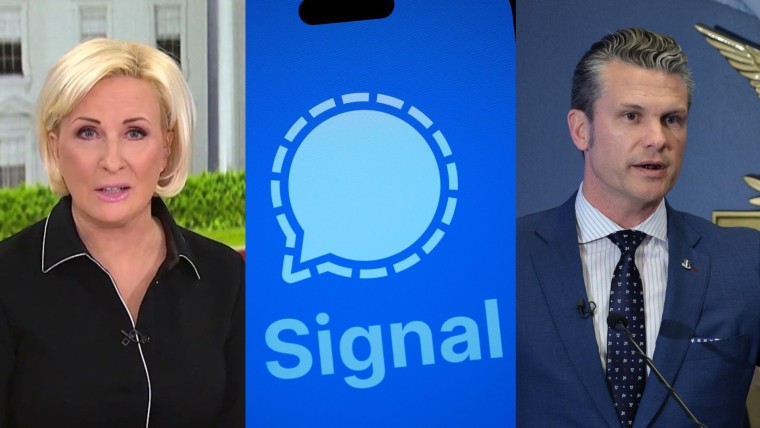That the Trump administration would have another Signal scandal is not surprising, but it doesn’t make this weekend’s revelations about Defense Secretary Pete Hegseth any less staggering. We learned that last month, Hegseth recklessly shared strike plans — endangering American fighter pilots and our sailors — in not just one unclassified group chat, but two.
Shortly before the U.S. military conducted a complex operation striking the Iran-backed Houthis in Yemen, the defense secretary shared sensitive national security and operational information about American troops on a Signal chat with his wife, his brother and his personal lawyer — people who had no reason to need to know about these upcoming strikes.
Anyone who has worn the uniform knows the importance of operational security.
This wasn’t the same thread initiated by national security adviser Mike Waltz that included the broader national security team. This was a separate group Hegseth started himself — on his personal phone. NBC News reports that the information originally came from Gen. Erik Kurilla, the head of U.S. Central Command, who “used a secure U.S. government system to send detailed information about the operation” to Hegseth. Within 10 minutes, Hegseth used his personal phone to share some of that information with “at least two group text chats.” He did so even though an aide had already warned him about sharing sensitive information about this specific operation on unsecure communications systems.
To take a step back, details about military operations are held at the highest levels of secrecy and classification to protect the operators executing the mission and the mission itself. The people who would have access to the details of strikes against the Houthis would be the president, the vice president, members of the National Security Council, the Joint Staff, the appropriate military combatant commands and others who “need to know” to perform their duties.
The first group chat that we learned about consisted of members of the national security team. He still shared sensitive information in a commercial text app but these were with people who typically meet the “need to know” threshold. But do Hegseth’s wife, brother and personal attorney have a “need to know” regarding when a military operation is going to start, the takeoff times of F/A-18s, the launches of the Tomahawk missiles and when the bombs will drop?
No.

Hegseth often invokes his military service — his deployments to Iraq and Afghanistan, his awards and his vision for restoring a “warrior ethos” in the Pentagon. But anyone who has worn the uniform knows the importance of operational security. Hegseth knows that when our fighter pilots are in the air and our sailors are readying for an operation, their livelihoods are on the line. For someone with Hegseth’s credentials, this wasn’t a lapse in judgment. It was a deliberate breach of trust.
Instead of taking even a shred of accountability, Hegseth has purged senior people in his office in recent days, including his own chief of staff, blaming them for leaks and unauthorized disclosures. If any of them did compromise sensitive information, accountability is warranted. But instead of facing the facts, Hegseth insists these detailed strike plans were “informal” and “unclassified” information shared for “media coordination and other things.” And he is blaming the media for “hit pieces” and “disgruntled former employees” who he says are trying to ruin his reputation.
How can our allies and partners around the world trust that Hegseth can safeguard secrets?
But media outlets didn’t type up the details about a military operation and put it into a unsecured chat with the national security team. Hegseth did. Former employees didn’t share the timing and targeting of an operation in a chat with Hegseth’s wife, brother and personal lawyer. Hegseth did.
The larger problem is that the defense secretary has put our military and the mission itself in jeopardy — and he has faced zero consequences.
Every single day, our service members and civilians risk their lives to protect our national security, defend the homeland and support allies abroad.
In 2016, Hegseth asked, “How damaging is it to your ability to recruit or build allies with others when they are worried that our leaders may be exposing them because of their gross negligence or their recklessness in handling information?

It’s time that Hegseth be asked that question. How can our service members feel safe as they conduct their missions not knowing if Hegseth has shared operational details in an unclassified group chat? How can our allies and partners around the world trust that Hegseth can safeguard secrets? What are our adversaries learning every day about the dysfunction leaking from the Pentagon?
If this had been any other employee at any other agency anywhere in the world, there is no question that employee would have been fired or immediately put on leave.
At the least, the American people deserve a congressional investigation into these repeated, deliberate and dangerous breaches of trust. And our service members and our allies deserve better than a defense secretary who thinks it’s appropriate to share information that could endanger the safety of the operators or the operation on a group chat — not just once, but twice.
